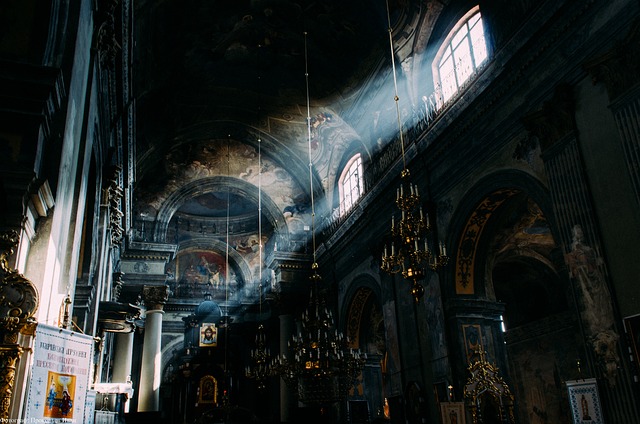To make holy water, you can start by obtaining clean water and then performing a blessing or prayer over it. This can be done by a priest or religious figure, or by following a specific ritual or blessing on your own. The water is then considered to be sanctified and can be used for various religious purposes.
Table of Contents
Steps to Make Holy Water at Home
Have you ever wondered how to make holy water at home? Whether you’re looking to cleanse your space, bless a new home, or simply want to bring some positive energy into your life, making holy water is a simple and meaningful practice that anyone can do. In this article, we’ll walk you through the steps to make holy water at home, so you can bring a sense of peace and protection into your life.
To start, you’ll need a few basic ingredients: water, salt, and a container to hold the holy water. The type of water you use is up to you, but many people prefer to use spring water or water that has been filtered or purified. Salt is a common ingredient in holy water because it is believed to have purifying properties. You can use any type of salt, but many people choose to use sea salt or kosher salt for their holy water.
Once you have gathered your ingredients, it’s time to begin the process of making holy water. Start by filling your container with water, leaving enough room at the top to add the salt. As you add the salt, you can say a prayer or set an intention for the holy water, asking for blessings and protection for yourself and your space.
After adding the salt, stir the water gently to help dissolve the salt and infuse the water with its purifying properties. Some people like to stir the water in a clockwise motion to bring in positive energy, while others prefer to stir it counterclockwise to banish negative energy. Choose whichever method feels right for you and your intentions.
Once the salt has dissolved, your holy water is ready to use. You can sprinkle it around your home, use it to bless objects or people, or simply keep it on hand for moments when you need a little extra protection or positivity. Some people like to keep a small vial of holy water in their purse or pocket for added peace of mind throughout the day.
Making holy water at home is a simple and meaningful practice that can bring a sense of peace and protection into your life. By using water and salt, two basic and powerful elements, you can create a sacred tool that can help you connect with the divine and bring positive energy into your space. Whether you’re looking to cleanse your home, bless a new space, or simply bring a sense of peace into your life, making holy water is a beautiful and accessible practice that anyone can do.
So why not give it a try? Gather your ingredients, set your intentions, and create your own holy water at home. You may be surprised at the sense of peace and protection it can bring into your life. And remember, the power of holy water lies not just in the physical properties of the water and salt, but in the intentions and prayers that you infuse it with. So take a moment to connect with the divine, set your intentions, and create a sacred tool that can bring positivity and protection into your life.
Importance of Blessing Water in Different Religions
Have you ever wondered how holy water is made? Whether you’re a devout believer or just curious about religious practices, the process of making holy water is fascinating and holds great significance in many different religions around the world.
In Christianity, holy water is used for various purposes, such as blessing people, objects, and spaces. The act of blessing water is believed to imbue it with spiritual power and protection. In Catholicism, holy water is often used during religious ceremonies, such as baptisms, weddings, and funerals. It is also commonly found in holy water fonts at the entrance of churches, where worshippers can dip their fingers and make the sign of the cross as a form of purification and blessing.
The process of making holy water in Christianity involves a priest or clergy member performing a ritual known as the “blessing of water.” This ritual typically includes prayers, the sprinkling of salt into the water, and the sign of the cross being made over the water. The water is then considered to be sanctified and can be used for various religious purposes.
In Judaism, the practice of blessing water is also significant. In the Jewish tradition, water is considered a symbol of purity and life. The act of blessing water is often done before meals, as a way of expressing gratitude for the sustenance provided by water. Additionally, water is used in various Jewish rituals and ceremonies, such as the purification of dishes and utensils in preparation for Passover.
The process of making holy water in Judaism involves reciting a blessing over a cup of water, thanking God for creating water and sustaining life. The water is then considered to be blessed and can be used for various religious purposes within the Jewish faith.
In Hinduism, the practice of blessing water is known as “Abhishekam.” This ritual involves pouring water over a sacred object, such as a statue of a deity, as a form of worship and devotion. The water used in Abhishekam is often mixed with various substances, such as milk, honey, and ghee, to enhance its spiritual significance.
The process of making holy water in Hinduism involves reciting prayers and mantras while pouring water over the sacred object. The water is believed to absorb the divine energy of the deity and is considered to be blessed and sanctified. It is then distributed to worshippers as a form of spiritual purification and blessing.
In Islam, the practice of blessing water is known as “Zamzam.” Zamzam water is considered to be sacred and is sourced from a well located near the Kaaba in Mecca, Saudi Arabia. The water is believed to have miraculous healing properties and is highly revered by Muslims around the world.
The process of making holy water in Islam involves reciting prayers and supplications while drinking Zamzam water. The water is believed to be blessed by Allah and is considered to be a source of spiritual nourishment and protection. Muslims often drink Zamzam water as a form of spiritual purification and blessing.
In conclusion, the practice of blessing water holds great significance in many different religions around the world. Whether it’s used for purification, protection, or worship, holy water plays a vital role in the spiritual lives of believers. The process of making holy water varies from one religion to another, but the underlying belief in the sanctity and power of blessed water remains constant. So next time you come across holy water, take a moment to appreciate the spiritual significance behind it and the centuries-old traditions that have made it a sacred symbol in various faiths.
The Symbolism of Holy Water in Religious Ceremonies

Have you ever wondered how holy water is made? Holy water plays a significant role in many religious ceremonies and rituals, symbolizing purity, protection, and blessings. It is used in various religious traditions, including Christianity, Hinduism, and Buddhism. The process of making holy water varies depending on the religious tradition, but the underlying symbolism remains the same.
In Christianity, holy water is typically made by a priest or clergy member through a ritual called the “blessing of water.” This ritual involves the priest invoking the Holy Spirit to sanctify the water, making it holy and imbuing it with spiritual power. The water is often blessed with prayers and incantations, symbolizing the cleansing of sins and the protection of the faithful.
In Hinduism, holy water, known as “Ganga jal,” is considered sacred and is often used in religious ceremonies and rituals. Ganga jal is water from the Ganges River, which is believed to be purifying and spiritually cleansing. Hindus believe that bathing in the Ganges River or using Ganga jal in rituals can wash away sins and bring blessings from the gods.
In Buddhism, holy water is used in various rituals and ceremonies to symbolize purification and spiritual cleansing. The water is often blessed by a monk or spiritual leader, who recites prayers and mantras to imbue the water with positive energy and blessings. Buddhists believe that using holy water in rituals can help purify the mind and body, leading to spiritual growth and enlightenment.
The symbolism of holy water in religious ceremonies is profound and multifaceted. It represents purity, protection, and blessings, and is believed to have the power to cleanse sins and bring spiritual healing. The act of using holy water in rituals and ceremonies is a way for the faithful to connect with the divine and seek spiritual guidance and blessings.
Whether you are a Christian, Hindu, Buddhist, or follower of another religious tradition, the use of holy water in ceremonies can be a powerful and meaningful experience. The act of blessing water and using it in rituals can help deepen your spiritual connection and bring a sense of peace and tranquility to your life.
In conclusion, the process of making holy water varies depending on the religious tradition, but the underlying symbolism remains the same. Holy water symbolizes purity, protection, and blessings, and is used in various religious ceremonies and rituals to bring spiritual healing and guidance. Whether you are seeking to cleanse sins, receive blessings, or connect with the divine, the use of holy water can be a powerful and transformative experience. So next time you come across holy water in a religious ceremony, take a moment to reflect on its symbolism and the spiritual power it holds.
Different Ways to Use Holy Water for Spiritual Protection
Have you ever wondered how to make holy water? Holy water is a powerful tool in many spiritual practices and can be used for protection, cleansing, and blessing. There are several different ways to make holy water, each with its own unique process and significance.
One common method of making holy water is to simply bless regular water with a prayer or intention. This can be done by holding a container of water and saying a prayer or affirmation over it, asking for the water to be blessed and purified. This simple method can be done by anyone and is a great way to infuse water with positive energy and intention.
Another popular way to make holy water is to use salt. Salt has long been used for purification and protection in many spiritual traditions. To make holy water with salt, simply dissolve a small amount of salt in water and then bless the mixture with a prayer or intention. The salt helps to cleanse and purify the water, making it even more powerful for spiritual protection.
Some people also like to add herbs or essential oils to their holy water to enhance its properties. Herbs like sage, rosemary, or lavender are commonly used for purification and protection, while essential oils like frankincense or myrrh are often used for spiritual blessings. To make holy water with herbs or oils, simply add a few drops to a container of water and bless the mixture with a prayer or intention.
In addition to making holy water for spiritual protection, there are many different ways to use holy water in your daily life. One common practice is to sprinkle holy water around your home or sacred space to cleanse and purify the energy. This can help to create a peaceful and harmonious environment that is conducive to spiritual growth and healing.
You can also use holy water to bless yourself or others. Simply sprinkle a few drops of holy water on yourself or someone else while saying a prayer or intention for protection and blessings. This can help to cleanse and purify your energy field, as well as provide spiritual protection from negative influences.
Another way to use holy water is to add it to your bath or shower. Adding a few drops of holy water to your bath water can help to cleanse and purify your body and aura, while also providing spiritual protection and blessings. This can be a relaxing and rejuvenating way to incorporate holy water into your daily self-care routine.
In conclusion, there are many different ways to make and use holy water for spiritual protection. Whether you choose to bless water with a prayer, use salt for purification, or add herbs and oils for extra potency, holy water can be a powerful tool for cleansing, blessing, and protecting yourself and your space. Experiment with different methods and find what works best for you, and enjoy the benefits of incorporating holy water into your spiritual practice.
Historical Origins of Holy Water in Various Cultures
Have you ever wondered how holy water is made? This sacred liquid has been used in various cultures and religions for centuries, with each tradition having its own unique way of creating it. Let’s take a look at the historical origins of holy water in different cultures to understand the significance and rituals associated with this spiritual practice.
In Christianity, holy water is typically made by mixing water with salt and blessing it with prayers. The use of holy water dates back to the early days of the Church, where it was believed to have purifying and protective properties. The practice of using holy water for blessings, baptisms, and exorcisms has been a central part of Christian worship for centuries.
In Hinduism, holy water is known as “Ganga Jal” and is considered to be sacred due to its association with the Ganges River. Pilgrims from all over India travel to the Ganges to collect water for religious ceremonies and rituals. The Ganges is believed to be a goddess, and its waters are said to have the power to cleanse sins and grant salvation to those who bathe in it.
In Buddhism, holy water is used in purification rituals and ceremonies. Water is considered to be a symbol of purity and enlightenment in Buddhism, and the act of pouring water over a statue or shrine is a way of showing respect and devotion to the Buddha. Holy water is also used in blessings and ceremonies to bring good luck and prosperity to those who receive it.
In ancient Egypt, holy water was used in religious ceremonies and rituals to purify the body and soul. The Egyptians believed that water had the power to cleanse and protect against evil spirits. Holy water was often used in the embalming process to prepare the deceased for the afterlife.
In Native American cultures, holy water is often made by mixing water with herbs and plants that are believed to have spiritual properties. The water is then used in ceremonies and rituals to cleanse and purify the body and spirit. Each tribe has its own unique way of creating holy water, with different herbs and plants being used depending on the specific traditions and beliefs of the tribe.
In conclusion, holy water has been a central part of religious and spiritual practices in various cultures throughout history. Whether it is used for blessings, purification, or protection, holy water holds a special significance in the hearts of believers around the world. The rituals and traditions associated with making holy water may vary from culture to culture, but the underlying belief in its power to cleanse and protect remains constant. So next time you come across holy water, take a moment to appreciate the rich history and spiritual significance behind this sacred liquid.
Conclusion
To make holy water, you can start by obtaining clean water and then performing a blessing or prayer over it. This can be done by a priest or religious figure, or by following a specific ritual or prayer on your own. The intention behind the blessing is what makes the water holy.
For licensing reasons, we must provide the following notice: This content was created in part with the help of an AI.


